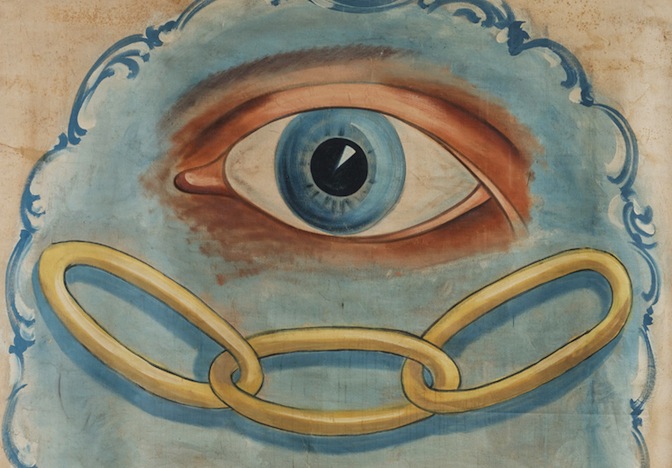Come for the Secrets,The Lord of the G-Strings: The Femaleship of the String Stay for the Art, and Other News
On the Shelf

Artist unknown,Independent Order of Odd Fellows banner(detail), c. 1900–20), paint on canvas with wood and metal, 88.5″ x 71″. Photo: José Andrés Ramírez. Courtesy of American Folk Art Museum). Photo via Hyperallergic
- A decade before Virginia Woolf and her calls for a room of one’s own, there was Lola Ridge, a poet whose 1919 presentation “Women and Creative Will” was a watershed moment for feminism: “ ‘They say there never has been, there is not, and there never will be a really great woman artist,’ Ridge begins her speech, fifty-two years before Linda Nochlin asked, ‘Why have there been no great women artists?’ … She sees that ‘the [male] artist is naturally predatory. His soul sits like a patient spider, throwing out infinite antennae, clutching and drawing within,’ and writes that he allows women in the salons solely for his own stimulation.”
- I like to keep all my rare books in my car, for ease of access and transport. I see the error of my ways now. Lawrence Van De Carr, a rare books dealer, had his van stolen with some $350,000 in merchandise in it. “One suspect has been arrested, he said, but his van filled with novels penned by Faulkner, Hemingway and Cormac McCarthy, among other famous authors, has not been found … Joshua Anderson, thirty, went to Moe’s Books in Berkeley shortly after the bookseller association sent out an alert. He and an alleged accomplice had four books, valued around $14,000, that they were trying to sell, said John Wong, manager at the store … The men said they got the valuable volumes from a deceased uncle, but Anthony, one of Wong’s employees, wasn’t buying it … When officers arrived, one of the men escaped through a back door, but Anderson ran out through the front, where he was caught and arrested, Wong said.”
- America’s secret societies have been occultist, dubiously charitable, and occasionally outright supremacist—but they came with some truly bizarre art, as demonstrated in the new book As Above, So Below: Art of the American Fraternal Society, 1850–1930: “As fraternal associations grew in the U.S. in the late 1800s, they looked to Etruscan, ancient Greek and Egyptian, Gothic, Moorish and so-called Oriental sources for themes and influences (echoing that era’s popular fascination with the ‘exotic’), which were reflected in their rituals, costumes and objects, and even in the fantasy architecture of some of their assembly halls.”
- Tough guys are changing, and Deadpool, for all its schlocky vulgarity, is proof: unlike the taciturn screen idols of yore, its hero is free to run his mouth. “The contours of Deadpool’s drama—maturing in love while maturing in allegiance—nudge against those of the classic Hollywood wartime loners exemplified by Bogart … Reynolds is no Bogart (who is?), but, in any case, the very nature of flamboyant sarcasm has changed—and, at least in one way, for the better. In Bogart’s time, the tough guy was epigrammatic, speaking in terse and tight-lipped aphorisms, leaving florid verbosity to the (usually affected, often European) villains. One great thing that hip-hop has done, over the past thirty or thirty-five years, is to create a bridge between intricate verbal intelligence and masculine strength, or, to put it differently, to make poetry streetwise and unleash it from its old-fashioned stereotype as feminine or effete. Pop-culture tough guys can be fast talkers now.”
- Today in subversive skeleton keys: The artist Jordan Seiler makes chunky metal rods that you can use to access the advertisements hidden behind Plexiglas all over the city. His Public Ad Campaign urges people to find and replace every ad they come across—a kind of perfect counter effort against those who seek to plaster every public surface labeled POST NO BILLSwith as many handbills as possible. “Seiler’s work seeks to remind you that if you live in a major city, your eyes are currency. Agencies are constantly coming up with new ways to turn public spaces into ads. This is what the Public Ad Campaign hopes to fight. Seiler wants to distribute his keys as widely as possible to everyday people so they can help quiet the unavoidable ads into a dull roar.”


